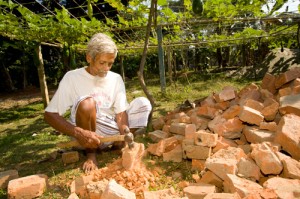This post was contributed by Dr Penny Vera-Sanso, a Senior Lecturer in Birkbeck’s Department of Geography, Environment and Development Studies. It is taken from her contribution to Facing the Facts: the truth about ageing and development, a campaigning publication launched today by Age International, a UK charity working for and with older people in developing countries.
 How we see old age in developing countries does not reflect the diversity of older people’s experience. We often assume that older people in these contexts are being made more vulnerable by changing family values. We also accept the ageism implicit in concepts such as ‘the old age dependency ratio’ that assumes all people over the age of 60 do not work and everyone between the ages of 15 and 59 does. None of these capture the realities facing many older people in developing countries, nor the contributions that they make.
How we see old age in developing countries does not reflect the diversity of older people’s experience. We often assume that older people in these contexts are being made more vulnerable by changing family values. We also accept the ageism implicit in concepts such as ‘the old age dependency ratio’ that assumes all people over the age of 60 do not work and everyone between the ages of 15 and 59 does. None of these capture the realities facing many older people in developing countries, nor the contributions that they make.
Rather than treat older people as dependants or blame old age poverty and vulnerability on failing family values, what is needed is a new approach to understanding later life; one that shifts the focus from what older people need to what they do. Such an approach dispels ageist stereotypes and convenient ‘blame-the-family’ attitudes; finding instead that older people’s work, whether paid or unpaid, is critical to household economies and plays a significant role in helping a nation to carve out a place within the global economy.
Households and economics
It is economics and government policy, more than culture and family values, that determine the size of a household – the people who share accommodation and living expenses. We are familiar with the idea of large extended households in developing countries comprising several generations, but this is not the only way in which older people and their families (if indeed they have extended families) live. Large extended households need substantial economic resources to support and maintain themselves. This is not always possible.
Where people only have access to low incomes, large extended households are not feasible. Families in this situation tend to form close-knit networks of smaller households. In these poorer settings, older people are not able to ‘retire’ from direct or indirect work because of both the demands of maintaining their own households and the help that related households might need.
The need for better data
Tracking older people’s contribution to the economy is hampered by poor data collection, including differing assumptions of what counts as economic activity. Often, older people’s efforts are merely characterised as ‘helping out’ or ‘passing time’ and do not cover the full economic contribution they make. A much wider perspective is necessary, one that looks at the economic effects of what older people do. Through their low-paid work, self-employment or unpaid work in family businesses, older men and women provide low-cost inputs to industry and low-cost services to workers. This, in turn, enables national economies to offer low-cost services and products in the global market place. Older people are also subsidising national budgets, by taking on caring roles that younger women would otherwise do, and releasing them into the labour force. In other words, for the very lowest costs they are creating a condition that is critical to achieving economic growth – the expansion of the female workforce.
The economic realities of older people are not explained by old age dependency or declining family values. These stereotypes of later life are obscuring the recognition of older people’s paid and unpaid work and undermining their rights. Alongside recognising their value to the economy, what is urgently needed now are measures to put older people in the driving seat – that is, recognition of their rights as workers; their right to work and their right to a pension that is sufficient to allow them the choice of whether to work, what work to do, and for how long.
Read more about Age International’s campaigning work.
